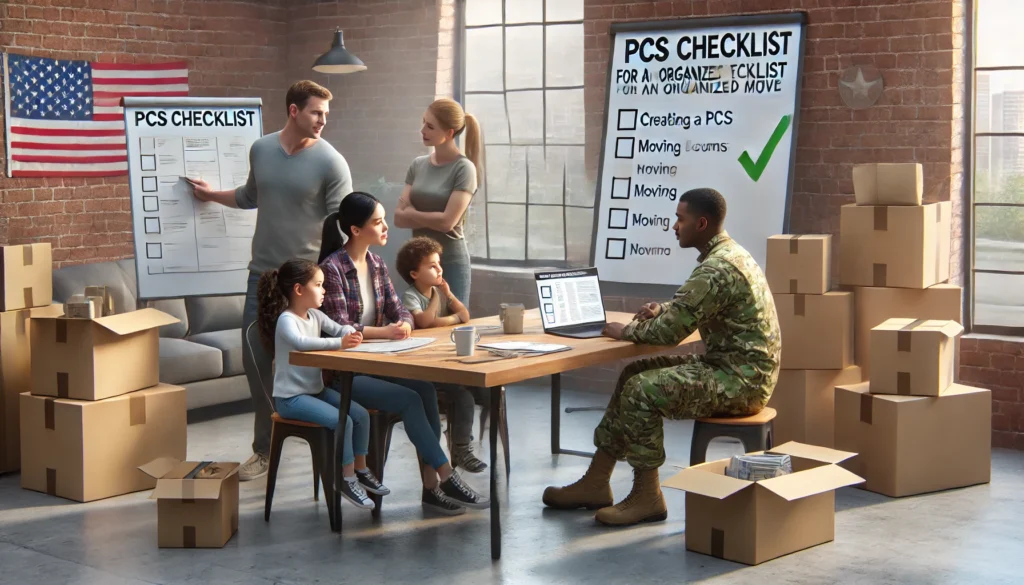Navigating the PCS: What Military Families Need to Know About Relocation
Military families are no strangers to relocation, as Permanent Change of Station (PCS) moves are a regular part of military life. However, even for seasoned families, each move can present unique challenges. The good news is that with proper planning and the right resources, you can make your next PCS move as smooth as possible. In this blog, we’ll walk you through what you need to know about PCS, how to prepare, and the resources available to support your family during the process.
What is PCS?
A Permanent Change of Station (PCS) is a transfer of a service member to a new duty station. It may be within the continental United States (CONUS) or overseas (OCONUS). These moves can be exciting, but they also come with deadlines and timelines that must be adhered to. PCS orders typically include a report-by date, which is the deadline for when the service member must report to their new command or base. This usually means your family has limited time to find new housing, pack, and move.
Common PCS Timeline:
- PCS Orders: PCS orders can come with very little advance notice, typically ranging from a few months to just a few weeks.
- Preparation Phase: The first step after receiving orders is to start preparing by creating a timeline for the tasks ahead, such as packing, finding housing, and scheduling transportation.
- Move Date: The actual move may be handled by military contractors, but it is important to coordinate with the moving company early to lock in your desired dates.
Creating a PCS Checklist for an Organized Move
Staying organized is the key to a successful PCS move. One of the most effective ways to stay on top of everything is by creating a detailed checklist. Here are a few items you should definitely include:
- Notify Housing Office/Current Landlord: Whether you’re living in on-base housing or renting off-base, you need to give appropriate notice. Make sure you check your lease for any clauses related to early termination due to military orders.
- Medical and Educational Records: Gather all important records such as medical, dental, and school transcripts to avoid delays in getting settled at your new location.
- Plan Temporary Housing: Sometimes your new home may not be immediately available, so having a plan for short-term lodging is essential.
- Schedule Movers: The military contracts movers, but you’ll want to make sure you’re on their schedule as early as possible. Confirm dates, take inventory of your household items, and keep an eye on the packing process.
Dealing with the Stress and Uncertainty of a PCS
Moving, in general, can be stressful, and a PCS comes with its own set of uncertainties. Whether it’s adapting to a new city, making new friends, or the logistics of moving across the country or overseas, stress can build quickly. Here are some ways to manage the emotional toll:
- Focus on What You Can Control: The unknown can be overwhelming, but focusing on the aspects of the move you can control (such as packing and organizing) can provide a sense of accomplishment.
- Engage Your Family: Talk to your children and spouse about the upcoming move and involve them in decision-making where appropriate. This can help ease their anxiety.
- Take Breaks: The PCS process is a marathon, not a sprint. Take time for yourself, whether it’s a short walk, exercise, or simply stepping away from planning.
Utilizing Military Resources for Assistance
The military provides a wide array of resources to make PCS moves less stressful. Be sure to tap into these to simplify your relocation:
- Base Housing Office: This is your go-to resource for housing information at your new duty station. They can help you determine whether on-base or off-base housing is best for your family.
- Transportation Office: They handle the logistics of your household goods move, and they will be your main point of contact for scheduling movers.
- Military OneSource: This is a valuable resource for everything from financial advice to counseling services, and they offer tools to help you plan and manage your PCS.
- Relocation Assistance Program: Available at most installations, this program offers information on your new location, workshops, and counseling for families in transition.
Connecting with Local Support Networks
Moving to a new area can feel isolating, especially for military families who often leave behind friends and familiar support systems. Fortunately, there are many local support networks designed to help military families connect and build a new community.
- Military Spouse Groups: Many bases have spouse groups that offer social events, mentorship, and support during the relocation process. These groups can be great resources for making new friends and learning the ropes at your new base.
- Online Communities: There are countless online forums and social media groups for military families relocating to specific duty stations. These groups provide insider tips on schools, neighborhoods, and local resources.
- Children’s Services: Many bases have Child Development Centers (CDC) and youth programs that can help children acclimate to their new environment and make new friends.
Conclusion While PCS moves are a reality of military life, they don’t have to be overwhelming. With careful planning, a solid checklist, and the help of military resources, your next move can be smoother and less stressful. By staying organized and connected to support networks, you’ll be able to transition to your new home successfully, no matter how many times you have to do it.
Navigating a PCS may always present challenges, but with the right approach, military families can not only survive but thrive through the experience.


